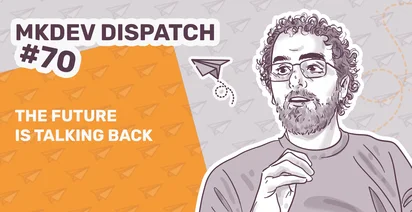The Future Is Talking Back | ✉️ #70

Hey! 👋
This week, something remarkable happened—something that, for years, has lived in the collective imagination of sci-fi lovers, tech dreamers, and moviegoers alike. We discovered that real-time voice translation in Google Meet is no longer a fantasy. You can now speak in one language, and the other person hears your words in theirs—translated live, with synthetic voice and all.
Sure, it's not perfect yet—not every language is supported, and the system still makes mistakes—but it's happening. It's real. And it’s wild.
I still remember when video calls became a thing. Back then, it was Skype that opened the door for most of us. It felt like something out of a futuristic movie—suddenly, you could talk to someone across the world, face to face, in real time. Today, that idea already feels old. Skype is gone. And now we’re here, watching another sci-fi trope become everyday reality.
In a few more years, maybe we’ll see flying cars buzzing above traffic jams, robots folding our laundry, or chips in our heads that instantly decode the world around us. But let's be honest: for every mind-blowing innovation, there’s also uncertainty, disruption, and a wave of change that not everyone is ready for.
Jobs will disappear. New ones will emerge. Some people will thrive. Others will feel lost. Many will feel like the world is spinning too fast.
But this isn't new. It’s the story of every major technological shift. I think about my mother, who still struggles to use her mobile phone. But I also remember when VHS tapes first arrived, and she found them just as confusing. Imagine the shock when electric lights first flickered on, or when radios started speaking into living rooms. Every generation has its own moment of disbelief.
So no, we don’t need to panic. We don’t need to resist every new thing or fear what’s ahead. The best we can do is stay curious, stay adaptable, and enjoy the ride. Because, like it or not, the future isn’t waiting.
It’s already calling—and it’s speaking your language.
What We've Shared
- DevOps Accents #61: Vibe Coding — a Downfall or a Breakthrough? with Tammuz Dubnov from AutonomyAI. If you haven’t been living under a rock, you’ve definitely heard a lot about Vibe Coding. Some drag it through the mud, others meme it to death, some treat it like a guilty pleasure, and then there are those who embrace it openly, seeing it as the future. We decided to dig into the phenomenon and start with the perspective of someone who’s building a product that’s taking Vibe Coding to the next level.
- How to Track Your Employees’ Mental Health Efficiently and Ethically: A roundup by the team behind Welbemo from episode 60 of DevOps Accents.
And on the website there's a new article, while our Dockerless Course continues with its next lesson.
- Cloud Security Checklist: 7 Essential Steps. Cloud security isn't just a tech problem—it's a human one, with 99% of breaches caused by simple user mistakes. In this article, Kirill Shirinkin offers a no-nonsense 7-step checklist that any team can follow to dramatically reduce cloud security risks, plus the tools to automate and scale it.
- The Standards Behind the Modern Container Images: If you've ever wondered what's really inside a container image, this article by Kirill Shirinkin takes you on a hands-on journey through the OCI image-spec to show you exactly how it all works under the hood. It’s not just theory—you’ll inspect real image files, see how digests, manifests, configs, and layers fit together, and uncover why Docker tags are just metadata illusions.
What We've Discovered
- AI Index Report 2025, Stanford: One of the most mind boggling numbers in this report: "Driven by increasingly capable small models, the inference cost for a system performing at the level of GPT-3.5 dropped over 280-fold between November 2022 and October 2024.". Check the rest of it too - it's one of the highest quality reports on the state of AI out there.
- But what if I really want a faster horse? Besides the main point - "everything becomes TikTok" - being as valid as ever, another good observation is that the UI/UX of almost every single popuplar application out there just gets worse and worse, not even mentioning that it also gets slower and more buggy. We got way more powerful hardware, only to end up with way lower performance of the apps we use.
- terraform-backend-git: Not sure we are going to start using git repositories as the backend solution for Terraform state files, but you should still read the explanation of why it's a good idea. Implementation itself is also quite smart, especially around solving the locking process.
- How to Substitute SSH with AWS Session Manager: This is your regular reminder that there is no good reason not to use AWS Session Manager to access your instances. Besides pure convenience, you also get identity-based authorization, session encryption and audit log of every action performed on your nodes - easily queryable in CloudWatch Logs.
- Orchestrating AI: Dynamic LLM Routing based on AWS Step Functions. Reference implementation of routing LLM requests using AWS services. Primary idea is to assess the request complexity, and invoke appropriate model for each request.
The 71st mkdev dispatch will arrive on Friday, June 6th. See you next time!
